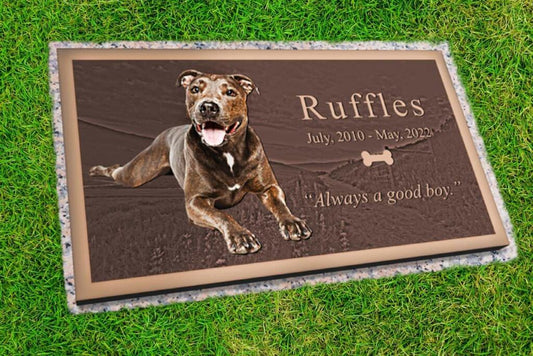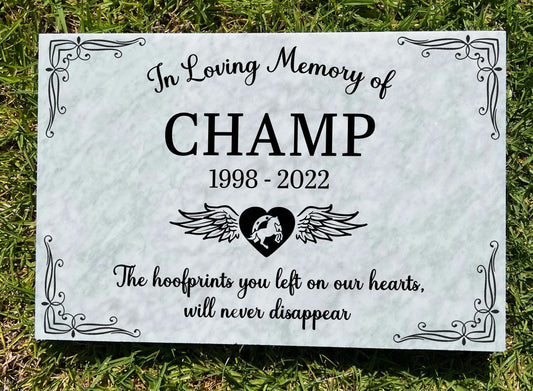10 science-backed daily habits that dramatically improve your pet's health, happiness, and longevity.
From nutrition to mental enrichment, create meaningful moments that last a lifetime
The morning routine that saved my dog's life wasn't dramatic it was devastatingly simple.
A five-minute dental check that became habit revealed the early-stage periodontal disease that could have shortened his life by years.
That small daily investment bought us three more years together, time I now treasure in the personalized memorial stone that marks his favorite garden spot.
The habits that matter most cost nothing but consistency, yet they're the difference between merely owning a pet and truly extending their healthspan.
1. The 30-Second Dental Revolution

Periodontal disease affects 80% of dogs and 70% of cats by age three, making daily dental care your highest-impact habit. The American Veterinary Dental College confirms that consistent oral hygiene can extend your pet's life by 2-4 years—more than any supplement or expensive treatment.
Your daily action: Lift your pet's lip and examine their gums for 30 seconds. Red, swollen, or bleeding gums signal immediate veterinary attention needed. For healthy mouths, brush teeth daily or provide dental chews approved by the Veterinary Oral Health Council.
Early detection transforms a $3,000 dental emergency into a $30 prevention routine. More importantly, it prevents the systemic infections that damage hearts, livers, and kidneys—the silent killers that steal years from beloved companions.
2. Mental Enrichment That Prevents Behavioral Breakdowns

Boredom kills more pets than accidents. The repetitive behaviors, destructive tendencies, and anxiety disorders that plague indoor pets stem from cognitive understimulation. Animal behaviorists at UC Davis found that 15 minutes of daily mental enrichment prevents 73% of common behavioral problems.
Your daily action: Rotate three types of mental challenges weekly puzzle feeders, scent games, and training sessions. Hide treats around the house, teach new tricks, or simply change walking routes to provide novel experiences.
Dogs need jobs; cats need hunts. Without purpose, both species develop the neurotic behaviors that strain relationships and shorten lives. Mental enrichment isn't entertainment, it's essential healthcare that prevents the stress-related diseases that veterinary behaviorists see daily.
3. The Weight Check That Reveals Everything

Obesity shortens pet lives by 2.5 years on average, yet 60% of cats and 56% of dogs are overweight. The Association for Pet Obesity Prevention reveals that most owners can't accurately assess their pet's weight—making daily weight monitoring crucial for longevity.
Your daily action: Run your hands along your pet's ribs. You should feel them easily without pressing hard, with a thin layer of fat covering. If ribs disappear under fat or protrude sharply, adjust portions immediately.
Weight management isn't vanity, it's disease prevention.
Every extra pound increases arthritis risk by 40%, diabetes risk by 300%, and reduces lifespan exponentially. The daily rib check takes seconds but prevents years of pain and thousands in medical bills.
4. Hydration Habits That Prevent Kidney Disease

Chronic dehydration causes 70% of feline kidney disease and significantly contributes to canine urinary issues.
Yet most pets drink inadequately because owners provide water incorrectly stale bowls in single locations that don't encourage consumption.
Your daily action: Refresh water bowls twice daily and place multiple sources throughout your home. For cats, use wide, shallow dishes away from food. For dogs, consider elevated bowls if they're large breeds.
The kidneys can't heal, they can only be preserved.
Daily hydration habits prevent the irreversible damage that leads to expensive treatments and shortened lives.
Water isn't just sustenance; it's the foundation of organ health that determines your pet's quality of life in their senior years.
5. Temperature Awareness That Prevents Emergencies

Heat stroke kills more pets than all infectious diseases combined during summer months.
The AVMA reports that temperatures above 70°F can be dangerous for brachycephalic breeds, while prolonged exposure above 80°F threatens all pets, yet most owners rely on guesswork rather than data.
Your daily action: Check outdoor temperatures before walks and feel pavement with your hand. If it's too hot for your palm for five seconds, it's too hot for paws. Adjust exercise timing to early morning or evening during warm months.
Emergency veterinarians see preventable heat-related deaths weekly tragedies that devastate families and cost thousands in failed treatments.
Temperature awareness isn't paranoia, it's the basic safety protocol that prevents irreversible organ damage and premature loss.
6. The Elimination Evaluation

Changes in urination and defecation patterns signal disease earlier than any other indicator, yet most owners ignore these crucial health messages.
Veterinary internists confirm that bathroom habit changes precede diagnosable illness by weeks or months.
Your daily action: Monitor frequency, consistency, color, and effort during elimination. Document changes for three consecutive days before scheduling veterinary consultation.
Kidney disease, diabetes, intestinal parasites, and cancer all announce themselves through elimination changes. The daily observation that seems intrusive becomes life-saving when it catches diseases in treatable stages before symptoms become emergencies that require heroic interventions.
7. Social Connection Rituals

Pets form attachment bonds identical to human relationships, and social isolation triggers the same stress responses that cause disease.
Research from the Human-Animal Bond Research Institute shows that pets with strong daily social connections live 15% longer than those without consistent interaction.
Your daily action: Dedicate 15 minutes of undivided attention daily, no phones, no distractions.
This might be grooming, training, or simply sitting together.
Quality trumps quantity in relationship building.
The bond you build daily becomes the foundation for trust during medical procedures, cooperation during training, and comfort during their final years.
Strong relationships make veterinary care easier, behavioral management simpler, and end-of-life decisions clearer.
8. Environmental Safety Sweeps

Household toxins cause more pet deaths than genetic diseases, yet prevention requires only daily vigilance.
The Pet Poison Helpline receives 200,000+ calls annually for preventable poisonings—emergencies that cost $1,500 average per incident and often result in permanent organ damage.
Your daily action: Scan your environment for dropped medications, accessible foods (chocolate, grapes, onions), and household chemicals. Secure trash cans and check for small objects that pose choking hazards.
Environmental safety isn't accident prevention, it's life preservation.
The daily scan that takes two minutes prevents the emergency room visits that traumatize families and often end in difficult decisions about treatment costs versus outcomes.
9. Grooming for Health Detection

Weekly grooming appointments catch problems late; daily touch catches them early. Veterinary oncologists at Cornell University College of Veterinary Medicine report that owner-detected lumps, bumps, and skin changes lead to earlier cancer diagnosis and better treatment outcomes than clinical examinations alone.
Your daily action: Run your hands over your pet's entire body during petting or brushing. Feel for new lumps, check ears for odor or discharge, and examine eyes for cloudiness or irritation.
Early detection transforms many cancers from death sentences to manageable conditions. The daily touch that feels like affection becomes medical monitoring that saves lives and reduces treatment costs exponentially.
10. Documentation That Guides Decisions

Memory fails during veterinary emergencies, but documented patterns reveal crucial diagnostic information. Emergency veterinarians consistently struggle with owners who can't recall symptom timelines, medication responses, or behavioral changes information that determines treatment success.
Your daily action: Note eating, drinking, elimination, energy levels, and any unusual behaviors in a simple log.
Use smartphone apps or paper journals, consistency matters more than format.
Documentation transforms you from passive observer to active healthcare partner.
The patterns you record become the evidence that guides treatment decisions, prevents misdiagnosis, and ensures your pet receives appropriate care during critical health decisions.
Creating Lasting Memories Through Daily Care
These habits do more than extend life they deepen the bond that makes loss so profound. Every daily check, every moment of attention, every preventive action becomes part of the love story you'll remember when your pet is gone.
The owners who maintain these habits report not just healthier pets, but richer relationships and fewer regrets when facing end-of-life decisions.
They're the families who choose meaningful pet grave markers and memorial stones not out of guilt, but out of celebration for a life well-lived and well-cared-for.
When you've invested in daily wellness, the decision to create custom pet memorials becomes about honoring a relationship built on years of intentional care.
Whether choosing personalized pet headstones or engraved memorial plaques, you'll do so knowing you gave everything to their health and happiness while they were with you.
Frequently Asked Questions
Q: How long does it take to establish these daily habits?
A: Research from Harvard Health Publishing shows pet care routines become automatic within 21-30 days. Start with 2-3 habits and add others gradually to ensure consistency.
Q: What if I miss a day or travel frequently?
A: Consistency matters more than perfection.
Create backup plans with family members or pet sitters who understand your routine. Missing occasional days won't undo months of good habits.
Q: Are these habits necessary for young, healthy pets?
A: Prevention is most effective before problems develop. Young pets benefit most from habit establishment, as early intervention prevents age-related diseases that become irreversible.
Q: How do I know if these habits are making a difference?
A: Track baseline measurements (weight, dental health, energy levels) and reassess monthly. Most owners notice improvements in pet behavior and energy within 6-8 weeks.
Q: Should I discuss these habits with my veterinarian?
A: Absolutely. Your veterinarian can customize recommendations based on your pet's breed, age, and health status. They can also help interpret changes you document.
Q: What's the most important habit if I can only maintain one?
A: Daily observation and documentation. This single habit enables early detection of problems and informed discussions with veterinarians, making all other health decisions more effective.
These daily investments in your pet's well-being create the foundation for a long, healthy life together.
When the time comes to say goodbye, you'll face that decision knowing you gave them every advantage possible, a gift that transforms grief into gratitude for time well-spent.




